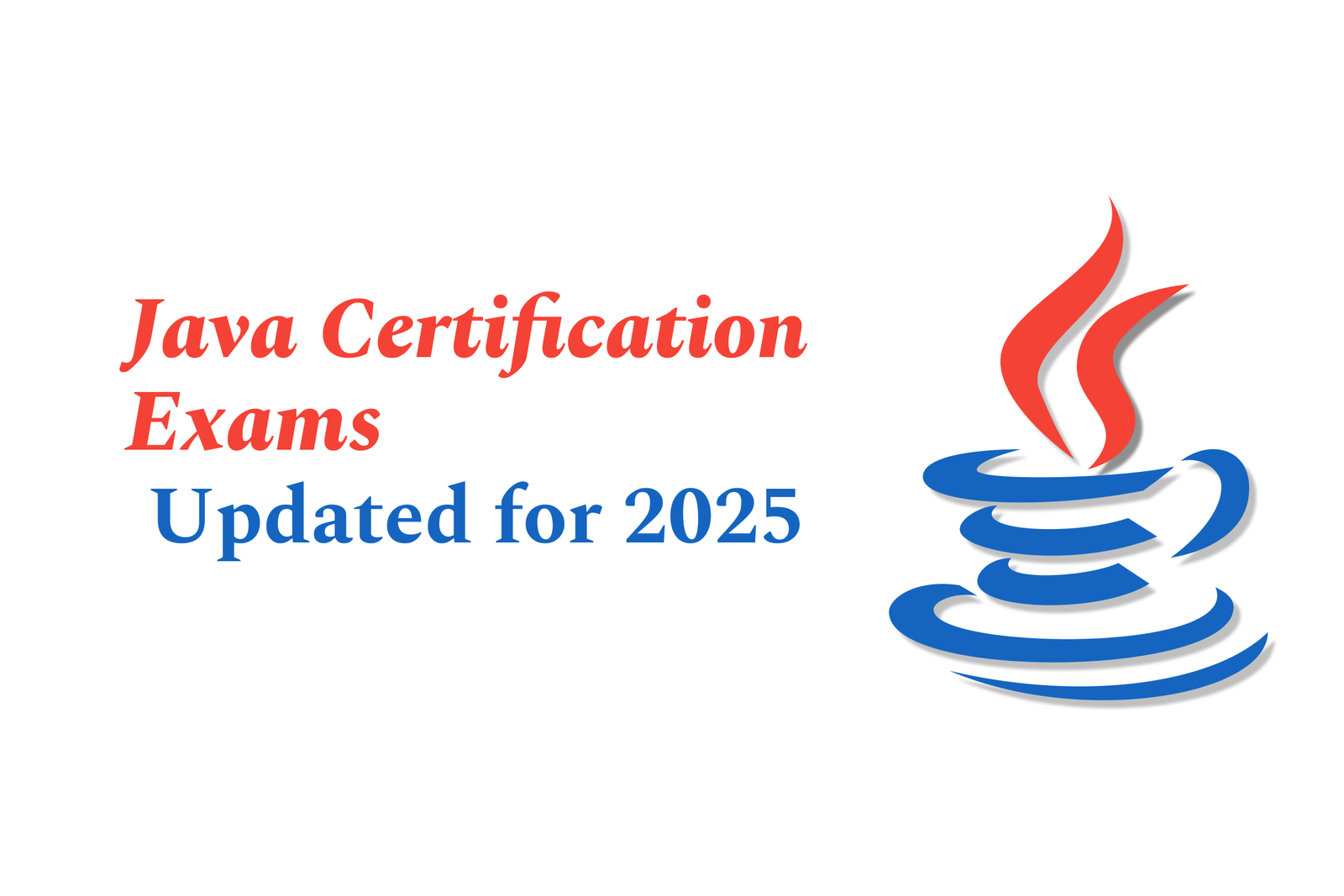Java Certification Exams Updated for 2025
The Java Certification Exams updated for 2025 feature revamped content reflecting the latest Java versions, enhanced practical skills focus, and streamlined paths. These changes ensure developers are certified on modern Java technologies, boosting career prospects and aligning with current industry needs.
Java Certification Exams Updated for 2025
1 ) Overview of Certification Updates
Oracle and other leading technology organizations have announced significant updates to the Java certification exams for 2025. These modifications aim to align the certifications more closely with contemporary Java development practices, cloud computing integration, and modern application requirements.
2 ) Key Changes in Exam Structure
The exams will feature updated content that reflects the latest Java SE versions and incorporate new features such as enhanced pattern matching, records, and sealed classes.
There will be a greater emphasis on practical skills, including hands on coding problems and scenario based questions simulating real world application design and troubleshooting.
The certification paths will be streamlined to reduce redundancy and focus on specialized topics like Jakarta EE, cloud native Java applications, and microservices architecture.
3 ) Preparation and Resources
Oracle University will provide refreshed training materials, including courses and practice exams aligned with the new exam format.
Candidates are encouraged to utilize updated official study guides, coding challenge platforms, and virtual labs to gain practical experience in updated Java technologies.
Additional resources such as webinars, workshops, and community forums will be made available for continuous learning support.
4 ) Renewal and Continuing Education
The certification renewal cycle may involve more frequent updates to ensure that credential holders stay current with evolving Java standards.
Continuing education paths will emphasize new certifications for emerging Java related fields such as cloud infrastructure, AI integration, and containerization technologies.
5 ) Impact on Career Prospects
Updated certifications are expected to enhance candidate credibility by demonstrating up to date expertise in Java development.
Employers will value certifications that reflect modern Java usage, thereby improving job prospects and supporting career advancement for certified professionals.
The modernization effort reinforces the importance of lifelong learning and adaptability in the rapidly changing software development landscape.
In summary, the 2025 updates to Java certification exams promise to modernize the credentialing process, making it more relevant for today's technology environment while providing comprehensive support to candidates preparing for their certifications.
https://justacademy.in/news-detail/what?s-new-in-swift-playgrounds-5.5
https://justacademy.in/news-detail/google’s-android-developer-tools-update
https://justacademy.in/news-detail/new-ai-features-in-android-apps
https://justacademy.in/news-detail/swift-concurrency-updates:-what-to-expect
https://justacademy.in/news-detail/why-react-native-is-the-best-choice-for-mvps-in-2025
Related Posts
Java supports GDPR and data privacy by enabling secure data handling through encryption, controlled access, and precise data management. It allows developers to minimize PII exposure, ensure data confidentiality, and design workflows that comply with data protection regulations effectively.
Java code quality tools have evolved to include advanced static analysis, integrated security checks, and AI-powered code reviews. These updates help developers detect bugs, enforce coding standards, and enhance security, streamlining the development process and improving overall code reliability.
Java remains a cornerstone in big tech companies, evolving with modern features like records, pattern matching, and virtual threads. Its robust ecosystem, enhanced performance, and growing AI integrations keep it vital for both legacy systems and innovative new projects.
Java and CI/CD pipeline optimizations streamline Java application development by automating builds, tests, and deployments. They improve efficiency through parallelization, caching, and secure secrets management, enabling faster feedback loops and more reliable, scalable software delivery.
Java supports modern cryptography standards through its flexible Java Cryptography Architecture (JCA), enabling integration of advanced algorithms like AES, EdDSA, and post-quantum tools. Libraries like Bouncy Castle offer FIPS-certified, hardware-accelerated implementations for secure development.
Java 23 enhances record patterns by enabling concise, direct destructuring of record components within pattern matching, simplifying type checks and data extraction. This improvement boosts code readability and expressiveness by reducing boilerplate in handling immutable data classes.
Java remains a top choice for mobile app backends, powering scalable, secure, and high-performance server-side solutions. Latest trends include cloud-native microservices, reactive programming, and enhanced JVM optimizations, enabling efficient, flexible, and robust mobile backend development.
Java SE 24 and LTS Java SE 21 offer enhanced features and performance, while Apache Spark 4.0.0 introduces Scala 2.13 support and advanced ML and SQL capabilities. Together, they empower developers to build scalable, high-performance data applications with modern tools.
JUnit 5 modernizes Java testing with a modular architecture, improved assertions, and seamless Java 8+ support. Beyond JUnit, tools like Mockito and AssertJ enhance mocking and assertions, creating a powerful, flexible ecosystem for writing clean, efficient Java unit tests.
Java plays a pivotal role in cloud automation tools by providing a robust, platform-independent language used to build scalable automation frameworks like Jenkins and Selenium, enabling efficient CI/CD pipelines, testing, and orchestration across diverse cloud environments.










